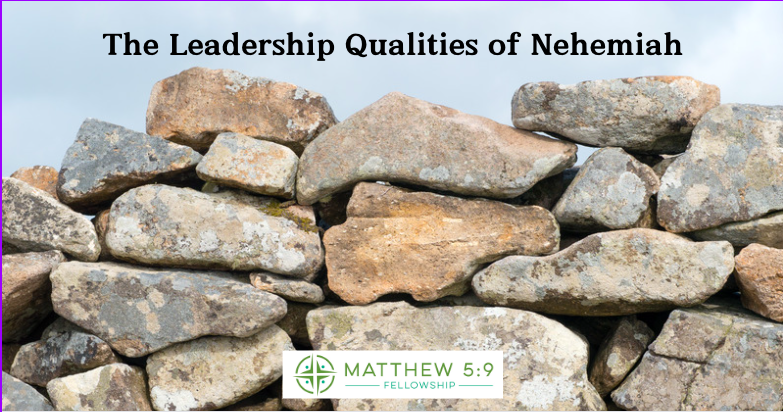Polarization in the workplace is certainly not a new topic. But what separates a leader from a manager when polarization is in play? Coworkers have disagreed on core subjects important to them and their own identities for years. But when normal disagreements become toxic, and being right becomes more important than accomplishing a goal to move the entire mission forward, it takes more than just project managers to overcome that toxicity. Leaders become a crucial part of the healing process.
Who was Nehemiah?
The writer of this lesser-known book in the Old Testament was a captive in Babylon at the time of his biographical account. He began his writings with intercessory prayer for his people, Israel, beseeching God to have mercy on them and return them to their homeland. Nehemiah listed specific dates under the inspiration of the Holy Spirit so that there might be a written record of the decree issued to rebuild Jerusalem.
Before he asked the king’s permission to rebuild Jerusalem’s walls, Nehemiah prayed, and God granted his request. As he was leaving Babylon, he met some Arab men who mocked him for what he was about to do. Rebuilding the walls of Jerusalem was a meaningful sign to the enemies of Israel. Nehemiah 2:20 records his statement, which is a testament to who has the right to the city known as Jerusalem: “I answered them by saying, ‘The God of heaven will give us success. We, his servants, will start rebuilding, but as for you, you have no share in Jerusalem or any claim or historic right to it.'”
Let’s examine Nehemiah’s remarkable personality traits and why they should matter to us today.
- Action-minded
Nehemiah approached his calling with great humility. He knew, as great leaders always do, that nothing great is ever accomplished without taking that initial step! Upon learning about the plight of Jerusalem and the broken walls, Nehemiah didn’t waste time lamenting. He immediately prayed, sought permission from the king, and set off for Jerusalem. This highlights his urgency and desire for action. Great leaders do more than just talk about what needs to be done; they get the ball rolling to make things happen.
- Kind-hearted
Learning about the suffering of his people, Nehemiah’s heart was absolutely broken. “They told me, ‘Those who survived the captivity are in the province. They are enduring serious troubles and being insulted. The wall of Jerusalem has been broken down, and its gates have been destroyed by fire.’ When I heard this, I sat down and cried. I mourned for days. I continued to fast and pray to the God of heaven.'” Nehemiah 1: 3 – 4. Nehemiah cared so much about his people, his country, and about the tragedy before him. Great leaders have compassion and empathy.
- Intelligent
After his allotted time of mourning, Nehemiah immediately knew what to do. He started praying to the Lord. But not just a conversation with God full of whining and lamenting–not at all! He prayed the Lord’s own words. He reminded the Lord of His own promises to His chosen people. Great leaders don’t reinvent the wheel; they recognize solutions that have worked well before, and they utilize them.
- Faithful
Nehemiah prayed fervently about the promise God had made His people for generations. “These are your servants and your people whom you have saved by your great power and your strong hand. Lord, please pay attention to my prayer and the prayers of all your other servants who want to worship your name. Please give me success today and make this man, King Artaxerxes, show me compassion.” (v. 10 – 11) Nehemiah prayed with passion and faith that God would hear, move, and change hard hearts, which may be a barrier to his intended goal. Great leaders act on the present moment, believing the end goal will be accomplished and successful.
- Well-loved and Unpretentious
While Nehemiah held the prestigious title of Cupbearer to the King, he didn’t hold that above others; he didn’t act pompous. And when he came into the presence of King Artaxerxes that day, after learning of the destruction in Jerusalem, the King noticed. He knew this man very well because Nehemiah had been by his side for so long. The king immediately recognized the distress on Nehemiah’s face and asked for an explanation. Upon hearing about the request of Nehemiah’s heart, the king granted him leave from his job. It may be the earliest record of a generous PTO plan by an employer! Great leaders have a heart that is not arrogant or pompous but is humble enough to ask for help when necessary.
- Ambitious Goal-Setter
Nehemiah was a goal-setter and a goal-getter. He saw the complete picture and the necessary steps to reach the end. He had the naysayers mocking him throughout the entire process, yet he ignored them and kept his eye on completing the wall with the resources he had on hand. Great leaders ignore the haters and keep those under their leadership moving forward with the necessary tasks to complete the mission.
- Cheerleader
He was a rally-er! A cheerleader for all the ranks! Nehemiah knew the work of rebuilding would require encouragement from the leaders in the group, so he led that charge. While he exalted God, Nehemiah also offered due recognition to his team, including the pagan king who had sponsored him. This motivated his own people and even enticed those on the periphery to become more involved. His tireless advocacy for those standing beside him was evident to all. Great leaders take a cue from Nehemiah and become their team’s most ardent supporters.
- Fortitude and Grittiness
Rebuilding a wall in a less-than-ideal environment, Nehemiah encouraged others to stay on task but to keep their eyes open to enemy attacks—tools in one hand, spear in the other. If Nehemiah had succumbed to distractions, the wall’s completion would have been dubious. His journey highlights the crucial challenge of prioritization today, demonstrating how a solid focus can persevere under pressure and opposition. Despite fear and discouragement, Nehemiah united the Israelites, inspiring them to trust God and collaborate towards a common goal. Great leaders push aside their own concerns for the greater good.
- Well-organized and Systematic
Additionally, Nehemiah knew precisely what he wanted from each group. He had blueprints and was a fantastic construction foreman. He cast the vision of what lay ahead under God’s leading, and when he asked his team to invest themselves, they had a clear vision of that end goal. Fifty-two days is all it took to rebuild this wall! Great leaders share the vision with their team early and often.
- Just and Fair
Nehemiah didn’t play favorites. All the economic classes of the day were included in the rebuilding. There were goldsmiths, priests, merchants, government officials, temple servants, Jericho citizens, Jerusalem, surrounding communities, and sons and daughters of all kinds. Including women in the physical work (Neh. 3:12) was quite unorthodox for this time and culture. He had a job for all of the community and offered no special treatment. He participated in the manual labor of rebuilding the wall, demonstrating his commitment to shared responsibility and refusing to place himself above the community he served. Great leaders consciously decide to be humble, just, and fair with their teams.
- Principled and Integrity-driven
Bravely refusing to allow slavery to continue, Nehemiah put an end to past iniquities. He actively addressed issues like debt bondage and unfair practices of officials, even when it meant challenging powerful individuals. He prioritized rebuilding the Temple and ensured adherence to God’s laws, demonstrating his deep commitment to moral principles. Great leaders stand up for what they know is right despite the risks.
Why it matters: What can we learn from Nehemiah?
In a time deeply fractured by animosity and suspicion, Nehemiah stood as a beacon of unity and action. He transcended the limitations of his own group, refusing to be confined by the echo chambers of his time. While others reveled in the division, Nehemiah facilitated the arduous work of fighting toxic polarization.
Amazingly, Israelites and foreigners, once divided by prejudice and mistrust, ended up toiling side-by-side, united by the common cause of rebuilding their city. This wasn’t mere luck; it was the fruit of Nehemiah’s deliberate leadership. He understood that actual progress couldn’t be achieved while clinging to the comfort of isolation. He dared to bridge the divisions, fostering collaboration where animosity had perhaps once festered.
Unfortunately, Nehemiah’s journey was not without its thorns. Standing up to his own group, even when it meant risking cherished relationships, demonstrated the depth of his convictions. He wouldn’t allow the comfort of in-group loyalty to supersede the greater good. He challenged bigotry within his own ranks, urging them to see beyond their differences and recognize the shared humanity that bound them.
Thankfully, Nehemiah’s legacy extends far beyond the physical walls he helped rebuild. His story serves as a powerful testament to the transformative power of collective action and the impact of outstanding leadership. He reminds us that despite seemingly insurmountable division, progress is possible when we choose to work together. Perhaps his most enduring lesson is that healing a fractured nation requires both words and the grit and determination to stand shoulder-to-shoulder, even with those we once considered adversaries. In the spirit of Nehemiah, let us, too, choose to be bridge-builders, not wall-builders, and work tirelessly to mend the rifts that threaten to tear us apart.
____________________________________________________________________________________________________
Leadership Qualities of Nehemiah
| Kind-hearted (Neh. 1:3-4) | Great leaders have compassion and empathy. |
| Intelligent (Neh. 7:1-4) | Great leaders don’t reinvent the wheel; they recognize solutions that have worked well before, and they utilize them. |
| Faithful (Neh. 4:4-6) | Great leaders act on the present moment, believing the end goal will be accomplished and successful. |
| Well-loved and unpretentious (Neh. 5:17-18) | Great leaders have a heart that is not arrogant but is humble enough to ask for help when necessary. |
| Ambitious goal-setter (Neh. 2:1-5) | Great leaders ignore the haters and keep those under their leadership moving forward with the necessary tasks to complete the mission. |
| Cheerleader (Neh 2:17-18) | Great leaders take a cue from Nehemiah and become their team’s most ardent supporters. |
| Fortitude and grittiness (Neh. 6:8-9) | Great leaders push aside their own concerns for the greater good. |
| Well-organized and systematic (Neh. 3:1-5) | Great leaders share the vision with their team early and often. |
| Just and fair (Neh. 10:29-39) | Great leaders consciously decide to be humble, just, and fair with their teams. |
| Principled and full of integrity (Neh. 4:16-22) | Great leaders stand up for what they know is right despite the risks. |
| Action-minded (Neh. 7:1-3) | Great leaders do more than talk about what needs to be done; they get the ball rolling to make things happen. |

April Brooks
April serves as the Senior Content Manager for One America Movement. She is a lifelong learner and an avid observer of people. A proud living kidney donor and a passionate fan of God and her family, she loves the power of a well-written word. April and her husband Michael live in northeast Mississippi near Tupelo in a tiny house they are renovating themselves. They are active members of Lawndale Presbyterian Church, also in Tupelo. April holds a B.A. in Business Administration from Faulkner University and a Master’s in Organizational Management from the University of Phoenix.
April serves as the Senior Content Manager for One America Movement. She is a lifelong learner and an avid observer of people. A proud living kidney donor and a passionate fan of God and her family, she loves the power of a well-written word. April and her husband Michael live in northeast Mississippi near Tupelo in a tiny house they are renovating themselves. They are active members of Lawndale Presbyterian Church, also in Tupelo. April holds a B.A. in Business Administration from Faulkner University and a Master’s in Organizational Management from the University of Phoenix.





